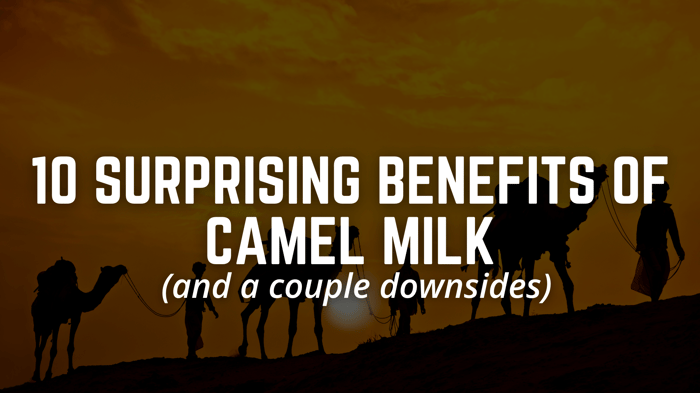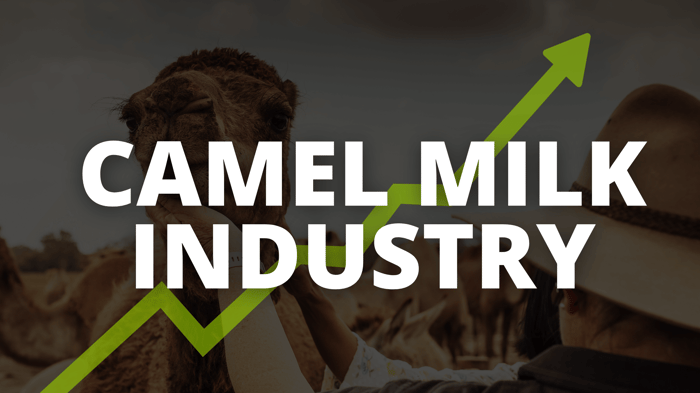Table of Contents
- The Benefits
- 1. Nutritionally Similar to Human Breast Milk
- 2. Rich in Nutrients and Lower in Fat
- 3. Lactoferrins and Immunoglobulins
- 4. High in Antioxidants
- 5. Supports Gut Health as a Natural Probiotic
- 6. Easy to Digest
- 7. A Traditional Staple Consumed for Centuries
- 8. Beneficial for Children
- 9. Great for Skin Health
- 10. Boosts Immune Support
- Potential Downsides
- Final Thoughts
Camel milk has been a dietary staple for centuries in many parts of the world. While it may seem exotic to some, its remarkable qualities are now making waves globally. Packed with unique nutrients, it stands out as an exceptional alternative to traditional milk options. In this blog, we’ll explore 10 surprising benefits of this unique superfood, ranked from the most unexpected to the least, and touch on a couple of potential downsides.
The Benefits
1. Nutritionally Similar to Human Breast Milk
One of the most surprising facts about camel milk is its similarity to human breast milk. Its nutrient composition closely mirrors the milk we consume as infants, making it uniquely compatible with our digestive systems. This similarity is believed to stem from its balance of proteins, fats, and other nutrients. It's natural alignment with human biology is a big reason why it has been traditionally used in certain cultures to support those with dietary sensitivities.
If you’re curious about trying something that feels naturally suited to your body’s needs, camel milk could be a fantastic choice.
 Fun Fact: Camels naturally keep a reserve of milk in their udder, ensuring their calves are always nourished.
Fun Fact: Camels naturally keep a reserve of milk in their udder, ensuring their calves are always nourished.2. Rich in Nutrients and Lower in Fat
Camel milk has an impressive nutrient profile, offering a better balance of some vitamins and minerals than cow’s milk. It contains 43% less fat, 10 times more iron, and three times the vitamin C found in cow’s milk. It’s also naturally lower in cholesterol, making it a thoughtful option for those aiming to consume nutrient-rich foods while keeping their diet light.
This balance of nutrients contributes to it’s reputation as a wholesome, natural beverage for people of all ages.
3. Lactoferrins and Immunoglobulins
This superfood is rich in bioactive compounds such as lactoferrins and immunoglobulins, which are naturally found in the milk of mammals. These compounds play a role in supporting the body’s defense mechanisms. Lactoferrins, for instance, are known to bind to iron, making it less available for harmful elements in the body while aiding nutrient absorption. These unique proteins make it stand out in the dairy world.
4. High in Antioxidants
Camel milk is a natural source of antioxidants, compounds that help protect the body from oxidative stress. Oxidative stress can result from exposure to free radicals, which are unstable molecules that may harm cells over time. While no food is a miracle cure, including antioxidant-rich options in your diet can be a small step toward a balanced, health-focused lifestyle.
5. Supports Gut Health as a Natural Probiotic
Probiotics are live bacteria that promote a healthy gut microbiome. Camel milk naturally contains these beneficial bacteria, which can support digestion and improve nutrient absorption. Unlike some probiotic supplements, it provides this benefit in a natural and enjoyable form, making it an easy addition to your daily routine.
Whether added to smoothies or consumed plain, camel milk’s probiotic qualities make it an appealing choice for those looking to nurture their gut health.
6. Easy to Digest
For those who experience discomfort with cow’s milk, camel milk offers an alternative that’s often easier to digest. This is due to its lower lactose content and the absence of the A1 casein protein found in cow’s milk, which can sometimes cause issues. While not entirely lactose-free, this milk composition makes it worth trying for those with mild sensitivities.
7. A Traditional Staple Consumed for Centuries
Camel milk has been a cornerstone of life for nomadic communities in East Africa, the Middle East, and parts of Asia for thousands of years. Camels are highly valued in these regions for their resilience and ability to provide sustenance in harsh environments. By enjoying camel milk, you’re connecting with a rich history and a tradition that has nourished countless generations.
This cultural significance makes it much more than just a beverage—it’s a symbol of sustainability and adaptability.
 Somali nomad with Camels
Somali nomad with Camels8. Beneficial for Children
The balanced nutrient profile makes it a natural choice for children in many cultures. Its blend of vitamins, minerals, and proteins provides key nutrients to support growth and development. While it’s not a replacement for formula or breast milk for infants, camel milk can be a great addition to a child’s diet as they grow older.
Its mild flavor also makes it easier for kids to enjoy, which is a bonus for parents looking to introduce something new to their family’s meals.
9. Great for Skin Health
Camel milk has been used in traditional beauty routines for centuries due to its soothing and hydrating properties. Its natural composition includes compounds like alpha-hydroxy acids (AHAs), which are often found in skincare products. These compounds gently exfoliate the skin, promoting a fresh, healthy glow.
Whether consumed or used as an ingredient in homemade skincare recipes, this superfood offers a unique way to nurture your skin naturally.
10. Boosts Immune Support
Camel milk contains compounds like immunoglobulins that play a role in supporting immune function. While no single food can guarantee immunity, including it as part of a well-rounded diet can contribute to a balanced lifestyle. This traditional beverage has long been appreciated for its nourishing properties.
Potential Downsides
1. It’s More Expensive
It is more expensive than cow’s milk, and there are several reasons for this:
- Female camels produce far less milk than cows—around 1.5 gallons per day, compared to the 6 gallons produced by a typical dairy cow.
- Camels only produce milk after giving birth, and their pregnancies last 13 months, which makes the production cycle slower.
- There are only a few thousand camels in the United States, and only two farms ship camel milk nationwide, limiting supply and driving up costs.
Additionally, increasing demand continues to outpace supply, adding to the price difference.
2. Pasteurization Requirements
Milk shipped across state lines in the United States must be pasteurized, per FDA regulations. While pasteurization ensures safety, it can impact the milk’s natural qualities.
At Juba Farms, we use a Low Input-Low Impact pasteurization machine that heats the milk to 161 degrees for 16 seconds. This process adheres to federal requirements while minimizing the effects on the nutritional profile of our milk. We are committed to bringing you camel milk that stays as close to its natural state as possible.
Final Thoughts
This is more than just a drink—it’s a unique experience rooted in tradition and packed with benefits. From its surprising similarity to human breast milk to its role in cultural heritage, camel milk offers something truly special. While it comes with a higher price and pasteurization requirements, these challenges reflect the care and effort that go into making this remarkable product available.
Curious to try it? At Juba Farms, we proudly provide 100% pure camel milk sourced from trusted U.S. farms, all at the best prices—guaranteed! Our advanced packaging system ensures your milk stays cold and fresh during transit. We deliver hundreds of orders nationwide, bringing high-quality milk directly to your doorstep.








